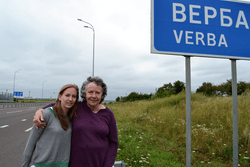What Does Resilience Look Like?
When we hear the word “resilient,” our minds may conjure up specific images of people we admire. We remember our teachers, our grandfathers, and the brave heroes from our history books. I think of my mother, who has lost both of her parents and five of her seven siblings, and is about to become a nurse practitioner at the age of 62. We almost always think of resilience as an immovable, unshakeable force within those we consider strong. We rarely hear “resilience” and think of ourselves.
In the past, I assumed resilience does not bend, or yield to fear or sorrow. I was sure that people who are resilient do not cry, or doubt, or allow themselves to be overwhelmed by the world. I saw resilient women who did not pay mind to uncertainties or insecurities—they lifted their heads in quiet, stoic dignity. Their steadiness and persistence shines—they don’t stumble over complicated sentences or mispronounce words. They are sure of their place at the table, or on the bima, or onstage. They are confident and captivating. Because of this, I never thought of myself as resilient. I sway under fear and sorrow. I shake under the weight of the world, and I stumble almost everywhere I go.
Previously, when I closed my eyes and prayed, I asked to become the woman I knew I was not—someone strong and resilient and fearless. Many of those prayers were apologies for not being good enough, for feeling overtaken by the chaos of the world, and for not trying harder to do what I knew I should be doing. I felt sure that nobody in my community would be proud of me, and I asked G-d for the strength to bounce back. I didn’t know it then, but in 2020, these prayers would ultimately lead me to an unexpected understanding of resilience and of my own identity.
In March of last year, as the pandemic swept through our nation, my rabbi told me that any statement can become a prayer, and I immediately worked "G-d, what the f**k?" into mine. When I mentioned this to a friend, they said, "That's a powerful prayer." This struck me because I hadn’t thought of my words as powerful—I felt desperate and wild and unfocused—but my friend was right. As it turns out, asking G-d “What the f**k?” became a window of clarity through which I could see myself for what I am. I am a chaotic human being, always nervous and always searching. I fear for the state of humanity, for my future, for the well-being of my friends and family, and for the health of the Earth. I am a tiny, tiny speck on a little blue planet full of life, soaring through the universe. The idea that my fear and clumsiness made me weak is not an idea that G-d spoke over me; it was an idea formed in the shadows of the world, and I gave it teeth. I let it grab hold of me and burden me with shame, guilt, and doubt. I allowed it to hold my tongue, and build a wall between me and a genuine, intimate relationship with the One who formed me. G-d was behind that wall the entire time, and apparently all I needed to do to start breaking it down was yell, “What the f**k?!”
Many people I know find comfort in keva—prayer that is structured, practiced, and predictable. We are rightfully proud of blessings and songs that have survived centuries. There is strength in singing the same words sung by our ancestors. But personally, I’ve always been more naturally inclined to kavanah—prayer that is spontaneous and comes from the heart—and assumed this was just because I was bad at memorization and relied too much on improvisation. In my family and my culture, as with many, women bear the responsibility of ensuring the survival of traditions by following expectations of raising and teaching children. I thought for sure that my clumsy attempts at prayer and ritual were setting me up to be a clumsy part of the community and a clumsy future mother. This past year, as I struggled with maintaining order and structure in my prayer life, G-d decided to gently remind me that really, truly, I was doing okay. Tattered and broken as I thought I was, G-d called me “resilient,” even when my prayer amounted to, “G-d, what the f**k are we going to do?”
When you realize you just shouted “What the f**k?” at the Sovereign Creator, you may experience a weird and wonderful flood of emotions. I burst out laughing, buried my face in my hands, and probably screamed again. It was relief, and with it came sadness, and hope, and frustration. I had never shouted such a prayer before! Regardless of profanities, I could tap into the presence of G-d during any moment I wanted. That made me feel strong. In the strangest and most beautiful of ways, I realized that I had lost sight of my own strength in my desire to “become” this picture of perfect resilience I had in my mind. I always saw resilient women remain sturdy and dignified in the presence of G-d, never a hair out of place and never missing a beat. But I was no less resilient, with my tears and shaking voice and improvised half-sentences. What I assumed made me weak and pitiful and unworthy of G-d’s time actually made me a more willing and fortified worshipper of the Divine. When I knew how deeply welcomed I was, no matter what I asked of G-d or shouted at G-d, I knew I could keep coming back to this presence, every day. I knew I could keep going. That is resilience.
As months rolled on, and the world as we knew it continued to crumble, I failed to log on to virtual Shabbat services every week. I failed to consistently practice reading and writing in Hebrew. I even failed at Hanukkah, because I forgot to buy menorah candles and ended up whittling down a Shabbat candle for the shamash and chopping up confetti birthday cake candles for the rest. Some days—a lot of days—everything seems like too much. Shame, fear, and guilt lurk in dark corners, but the light that fights against them is resilient. It flickers and dims, but it also grows and brightens, and it never fades completely. I keep going.
Our traditions have survived so much violence and hatred, and there is beauty, comfort, and power in the resilience of our customs and stories. I see pride and strength in every page of every siddur. While I believe G-d rejoices during every perfectly recited Amidah, I also believe G-d rejoices every time I barely remember to mumble bedtime shema, and when I look up asher yatzar just so I can laugh through a blessing, and even when I shout, “G-d, what the f**k?” My continued existence, my messy life and desperate pleas for help, and my persistence in seeking G-d are themselves resilience. Without even realizing it, I had let my preconceptions of my own weakness hold me back, because I didn’t think I could be of any use until I’d become this beautiful, resilient, powerful woman I formed in my mind. I was already that woman, even in my shambles. Resilience is not only found in our proud adherence to timeless traditions; we can also see it in our adaptations, our creations of new traditions, and simply in our continued existence as a people. My refusal to remain silent is resilience.
The chaos, devastation, and violence of 2020 and 2021 continue to cause immeasurable heartbreak, and many of us feel helpless and fragile in the wake of such rage and terror. Through all of this, we command ourselves to be resilient, but resilience does not demand perfection—resilience only demands that we keep going. I still seek the presence of G-d, even if I must scream and cry and let myself be profoundly, wildly human in my prayers. I needed this spiritual reconfiguration more than I knew at the time. When I started asking G-d “what the f**k?”, I started being more gentle with myself. I am here, and I belong. I can call myself “resilient” and know that I can keep going.








Amazing, Emma!
Girl, you said words I’ve said, but never thought about being resilient- but heck yes!!! I’m 69 yo and discovering so much. This brought me a new word, a new room to visit. God delivers messages in so many ways. Thanks for this message. Love you girl!!!!
Love this ❤️ I can your words touching my heart. I’ve asked a similar question many times maybe less bravely. For the upper teeth time yesterday I said aloud “G-d, really?? Can I get a little help here?”... keep writing and telling your story!!!
Well done! You've written with such refreshing transparency! Again, bravo!
Your courage in confronting inner chaos and despair, confirms the wise counsel of Polonius, in Hamlet: "To thine own self be true."
Press on!
Love
DVG